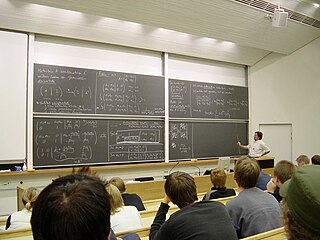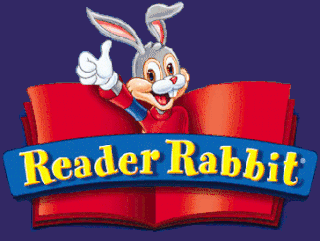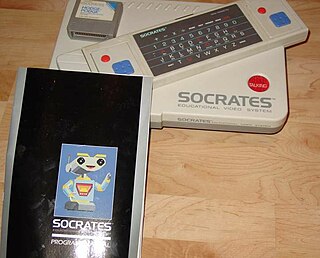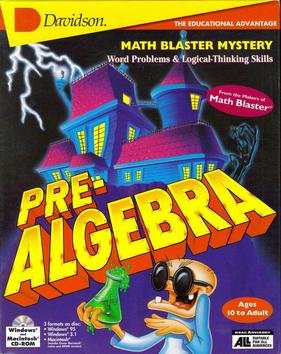
Division is one of the four basic operations of arithmetic. The other operations are addition, subtraction, and multiplication.
JumpStart is an educational media franchise for children, consisting mostly of educational games, produced by JumpStart Games. The series originally consisted of a series of educational PC games but has since expanded to include workbooks, direct-to-video films, mobile apps, and other media, including a massive multiplayer online game located at JumpStart.com, that were launched on March 10, 2009.
The Learning Company (TLC) was an educational software company founded in 1980 in Palo Alto, California and headquartered in Fremont, California. The company produced a grade-based line of learning software, edutainment games, and productivity tools. Its titles included the flagship series Reader Rabbit, for preschoolers through second graders, and The ClueFinders, for more advanced students. The company was also known for publishing licensed educational titles featuring characters such as Arthur, Scooby-Doo, Zoboomafoo, and Caillou.
Educational software is a term used for any computer software which is made for an educational purpose. It encompasses different ranges from language learning software to classroom management software to reference software. The purpose of all this software is to make some part of education more effective and efficient.

In contemporary education, mathematics education—known in Europe as the didactics or pedagogy of mathematics—is the practice of teaching, learning, and carrying out scholarly research into the transfer of mathematical knowledge.
Principles and Standards for School Mathematics (PSSM) are guidelines produced by the National Council of Teachers of Mathematics (NCTM) in 2000, setting forth recommendations for mathematics educators. They form a national vision for preschool through twelfth grade mathematics education in the US and Canada. It is the primary model for standards-based mathematics.

Reader Rabbit is an educational game franchise created in 1984 by The Learning Company. The series is aimed at children from infancy to the age of nine. In 1998, a spiritual successor series called The ClueFinders was released for older students aged seven to twelve.
Mathematics education in Australia varies significantly between states, especially at the upper secondary level.
Singapore math is a teaching method based on the national mathematics curriculum used for first through sixth grade in Singaporean schools. The term was coined in the United States to describe an approach originally developed in Singapore to teach students to learn and master fewer mathematical concepts at greater detail as well as having them learn these concepts using a three-step learning process: concrete, pictorial, and abstract. In the concrete step, students engage in hands-on learning experiences using physical objects which can be everyday items such as paper clips, toy blocks or math manipulates such as counting bears, link cubes and fraction discs. This is followed by drawing pictorial representations of mathematical concepts. Students then solve mathematical problems in an abstract way by using numbers and symbols.

An educational video game is a video game that provides learning or training value to the player. Edutainment describes an intentional merger of video games and educational software into a single product. In the narrower sense used here, the term describes educational software which is primarily about entertainment, but tends to educate as well and sells itself partly under the educational umbrella. Normally software of this kind is not structured towards school curricula and does not involve educational advisors.

Megamaths is a BBC educational television series for primary schools that was originally aired on BBC Two from 16 September 1996 to 4 February 2002. For its first four series, it was set in a castle on top of Table Mountain, populated by the four card suits. There were two gargoyles at the portcullis of the castle named Gar and Goyle who spoke mostly in rhyme, and an animated dragon called Brimstone who lived in the castle cellar. Each episode featured a song explaining the episode's mathematical content.
Modern elementary mathematics is the theory and practice of teaching elementary mathematics according to contemporary research and thinking about learning. This can include pedagogical ideas, mathematics education research frameworks, and curricular material.

Carmen Sandiego Math Detective is a 1998 Carmen Sandiego video game. It is similar in structure to Carmen Sandiego Word Detective, which was released a year before.

Carmen Sandiego Adventures in Math is a series of five games released in 2011/2012 for the Wii, and is part of the Carmen Sandiego franchise. The style of the games are reminiscent of comic books. The 5-part series were the first English language console games from the Carmen Sandiego franchise since The Secret of the Stolen Drums. These "short, educational detective adventures" were only available as a download through the Nintendo Wii Shop. The games were developed by Gamelion Studios, and published by Houghton Mifflin Harcourt. They could take up to 6 players, and required 600 Wii points. Maths topics included in the games include: Symmetry, Identifying angles, Graphing coordinates on a grid, Logic puzzles, Working with fractions, Solving equations, and Tangrams. The games are designed for elementary learners across grades 3–5.

Math Rabbit is a 1986 video game that serves as a spin-off to the Reader Rabbit edutainment series. It was made by The Learning Company for MS-DOS and Apple II. A Deluxe version was released in 1993 for MS-DOS, Macintosh, and Windows 3.x. Then in 1997, the game was remade for Windows and Macintosh as Reader Rabbit's Math 1. The final remake for Windows and Macintosh in 1998 is Reader Rabbit's Math Ages 4-6, with a personalized version released in 1999.

Math Blaster Mystery: The Great Brain Robbery is a product in a line of educational products created by Davidson & Associates that takes place in a different universe from the original Math Blaster. It has no relation to Davidson's earlier Apple II game Math Blaster Mystery. The game was released in North America, Sweden and Spain. The game was remade in 1998 with the title Math Blaster: Pre-Algebra. The game is regarded as a 'Review and Practice' type of software.

Math Blaster! is a 1983 edutainment video game, and the first entry in the "Math Blaster" series within the Blaster Learning System created by Davidson & Associates. The game was developed by former educator Jan Davidson. It would be revised and ported to newer hardware and operating systems, with enhanced versions rebranded as Math Blaster Plus! (1987), followed by New Math Blaster Plus! (1990). A full redesign was done in 1993 as Math Blaster Episode I: In Search of Spot and again in 1996 as Mega Math Blaster.

Mighty Math is a collection of six educational video games for the Windows and Macintosh platforms, developed and published by Edmark software. As the title indicates, the games are heavily oriented on mathematics. Two of each games cater for different age groups with fitting content. Carnival Countdown and Zoo Zillions are suited for Kindergarten and 2nd graders and teaches beginner topics. Number Heroes and Calculating Crew cater for 3rd till 6th graders and teaches intermediate topics. Astro Algebra and Cosmic Geometry are designed for 5th till 9th graders and teaches advanced topics. The games were all developed under Harcourt's strategy. In response to the series growing popularity, Edmark launched a website called the "Mighty Math Club" in November.

Mathletics is an online, educational website launched in 2005.












